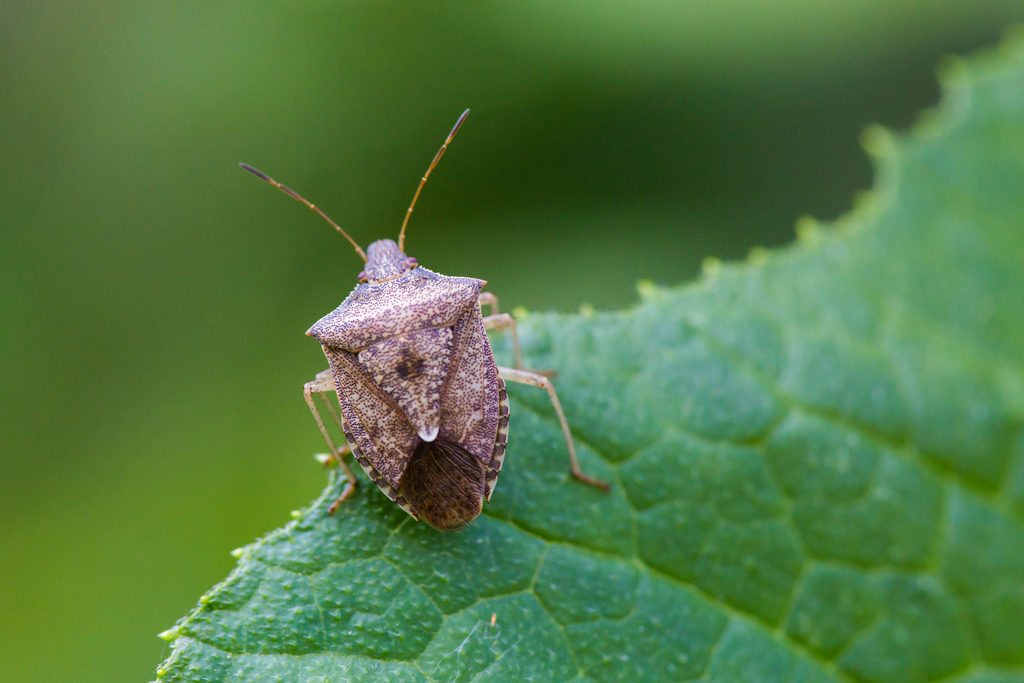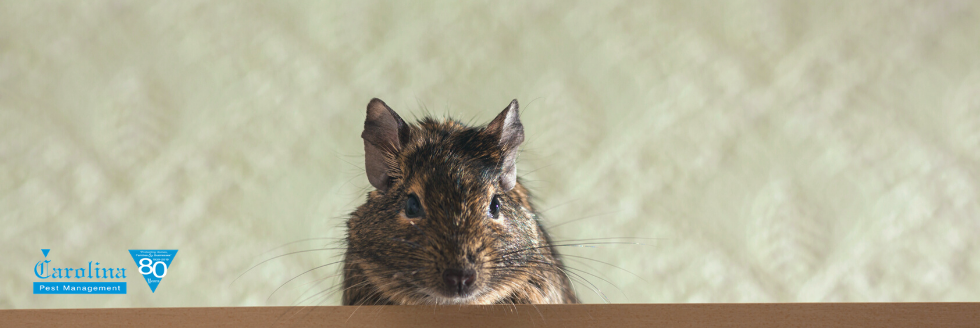Six Ways To Get Rid of Stink Bugs

The Stink Bug, i.e. the brown marmorated invasive pest (BMSB), was accidentally introduced to the US thro Pennsylvania in 1990. The first detected NC appearance occurred in Forsyth County in 2009. Officially tagged Halyomorpha halys, the brown stinkbug now resides as a widespread pest across the United States. They are now found in 44 states including the Carolinas and are a troublesome presence throughout the piedmont and mountain regions of our home state. According to papers from the NC State Extension, as of February 2017 this Asian native has confirmed residence in sixty-four of the 100 counties located in North Carolina.
Although acknowledged as devastating to an extensive selection of food crops, the BMSB tends to establish populations in roadside vegetation, local landscapes and structures – including homes that allow the bugs to ride out the chills of winter. Reports from NC homeowners, Metrolina organic gardeners and regional farmers taken from 2010 to 2015 reveal increasing stink bug invasions across the state. Late summer tends to be prime season for local stinkbug activity.
Stink Bugs – Here Again
Although stink bugs don’t pose a risk to the health of you or your family members, they are considered nuisance pests. During the spring and summer months, stink bugs take up residence in gardens and will feast heavily on vegetation. In fact, stink bugs have been attributed to causing significant damage to commercial farms by destroying fruit crops. Females will lay their eggs on plants, and both larvae and adults consume plant juices, fruits and vegetables.
Perhaps you are among those Charlotte homeowners who are starting to spot these pesky little insects on your window screens. Maybe some have already entered your Charlotte home. Fall is growing near, which means they may begin invading your home for the winter.
Stink bugs often become problematic inside a home during the cooler months when temperatures start to drop. The stink bugs seek out shelter for the coming winter, and once inside, they will consume clothing items and food within your pantries.
Stink bugs have earned their well-deserved notoriety by emitting a distinct noxious odor when threatened or killed. Squashing stink bugs isn’t typically advised since their foul odor lingers long after the stink bug has been killed. At Carolina Pest Management, we advise our clients to use these top strategies for ridding your property of stink bugs.
Your job now… Minimize the stinkbug home invasion.
However, this is a battle in which homeowners often fail to fully engage. Applied insecticides help reduce the initial invasion, and many homeowners consider this an effective defense. When applied by untrained non-professionals though, pesticides can leave a residual risk to homeowners, family and pets. Caution must be taken before, during and after the application of any high-risk insecticide solution.
There is also a second drawback to using insecticides to control stinkbugs and other Carolina regional pests. Whereas insecticides might provide only a short-term remedy, keeping pests out offers a more sure-fire approach to stinkbug control.
Six Steps to Prevent Stinkbugs and Other Pest Infestations
1. Seal Your Home
Stink bugs have the ability to fit through very small openings in your home’s exterior. Any hole or gap with a diameter larger than a pencil is big enough for stink bugs to sneak through. A well-sealed home not only keeps out pests, but also helps you reduce home energy expenses. Steps include:
- Sealing windows and doors
- Closing vents over the stove and fireplace
- Attaching screening materials to crawlspace and attic vents
- Repairing or replacing damaged door sweeps and thresholds
- AND sealing any other noticeable points of small critter entry.
Repair any cracks or holes with caulk to prevent stink bug access. Inside the home, caulk around doorways and windows.
2. Make Use of Sticky Traps and Dryer Sheets
Sticky traps stop everything crawly, including ants, spiders, stinkbugs, crickets and roaches.
Fragrant dryer sheets are another surprising deterrent for stink bugs. Homeowners who have rubbed dryer sheets on their window and door screens have found it reduced stink bug invasions by as much as 80 percent.
3. Keep it Clean and Repair Leaks
Keeping your home clean and reducing moisture will get rid of stink bugs and other types of pests. Remove any clogs from drains and fix leaky pipes to control moisture levels. Then:
- Put away dirty dishes
- Sweep and mop your floors
- Routinely empty the garbage
- Use plastic containers to better seal grains, pet food, rice, sugar and nuts
- AND kill the odor of foraging insects by wiping countertops with vinegar.
Pests are attracted to areas with water and with food. Never leave out food items after mealtimes and wipe down any food spills immediately. Keep any stored food items in airtight containers.
4. Routine Whole-House Vacuuming and Bag Checks
No sealing can prevent all insect entry into your home. Vacuuming catches the stragglers, cleans up before they can leave stains, get crushed and stink or breed additional problems.
Stink bugs can also travel undetected in packages and bags. Inspect all boxes or grocery bags for signs of the critters before bringing them into your home.
5. Eliminate Necessary Insect Survival Resources
Water is one of the main resources stink bugs need to survive inside a home. Drippy faucets, wet bowls and plates and outdoors water faucets all serve to ensure survival of unwanted household pests. So, do your best to eliminate these survival resources!
6. Eliminate Clutter
Like most Charlotte household pests, stinkbugs seek dark hiding places. Rather than stacking up piles of junk mail and old newspapers, eliminate such unnecessary items. Also avoid piling clothes on the floor of your closets or laundry room.
Removing Stink Bugs
If you do find stink bugs in your home, there are several techniques you can try using to remove them – but remember that you’ll likely be more successful by bringing in a pest professional.
First, Another natural method to remove stink bugs is to flick them into empty plastic bottles. By sealing them inside, any type of stench released by them will be contained.
Second, try a mixture of liquid detergent and water placed in a bucket. The mixture can be used to kill any stink bugs. Knock the stink bugs off of drapes, window screens, walls, etc. directly into the bucket. Avoid squashing them or touching them with your hands. If needed, use plastic gloves or a plastic bag to pick them up.
Vacuums can also be used to remove both live and dead stink bugs from the home without crushing them. After vacuuming the stink bugs, empty the vacuum immediately in an outdoor trash receptacle. A broom and dustpan will also suffice for gently sweeping up any visible stink bugs around the home.
If you’ve accidentally squashed stink bugs, you may be in for more as well. Squashing stink bugs outside around the entrance points into your home may cause stink bugs to flee due to a perceived threat. Hanging a damp towel outside in the evening hours may attract the stink bugs to the fabric. In the morning, dispatch the skink bugs by placing the towel in a bucket of soapy water.
Eliminate Stinkbugs in Charlotte with Professional Pest Control
Summer still reigns, but recent Carolina days have involved a bit of cool air. Some locals are already reporting signs of these pests in the home. It’s a sign that fall may bring in pests along with that nice cool air!
Carolina Pest Management offers professional, environmentally safe pest control throughout the Charlotte region. From humane removal of big wildlife invaders to natural pest control solutions, we’ve got you covered for all of your pest control needs in the Charlotte area. Our technicians will work one-on-one with you to develop a unique strategy that best suits your pest-related problems, including safer, greener and more effective pest control of local stinkbug populations. With offices in Charlotte, Monroe and Rockingham, we have a nearby pest control solution for you. Contact Carolina Pest Management to schedule an appointment today!


